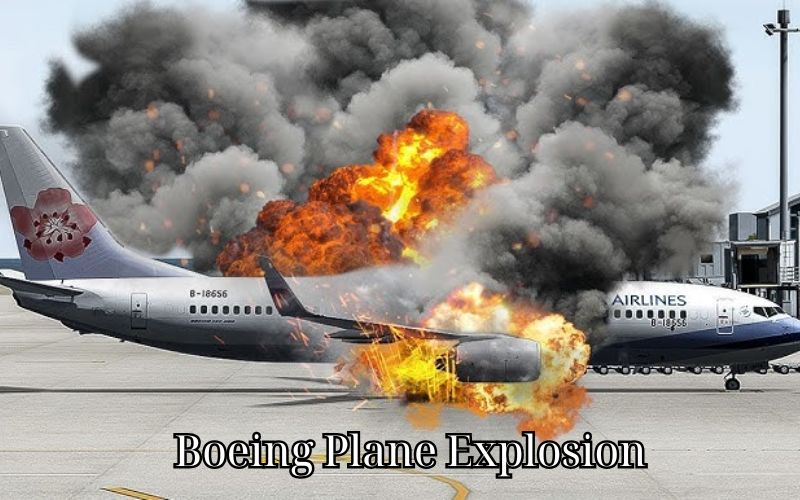Boeing planes have been a cornerstone of global aviation, recognized for their innovation, reliability, and safety standards. However, like any complex machinery, they are not immune to incidents, including the rare and tragic cases of explosions. Acpol.xyz explores the causes of Boeing plane explosion, notable incidents, and the safety measures in place to prevent such occurrences.
Understanding Boeing Plane Explosion
What Is a Boeing Plane Explosion?
A Boeing Plane Explosion refers to the violent combustion of fuel or other flammable materials, potentially leading to catastrophic failure. Such incidents can occur on the ground, during takeoff, or mid-flight.
Types of Boeing Plane Explosion in Aviation
- Fuel Tank Explosions: Often due to sparks or electrical malfunctions.
- Engine Explosions: Caused by mechanical failure or foreign object damage.
- External Factors: Sabotage or lightning strikes.
Notable Incidents Involving Boeing Planes
1. TWA Flight 800 (1996)
- Model: Boeing 747-100
- Incident: The flight exploded shortly after takeoff from JFK Airport.
- Cause: A fuel tank explosion triggered by an electrical short circuit.
- Impact: Led to significant changes in aviation safety regulations, including the introduction of inerting systems in fuel tanks.
2. UPS Flight 6 (2010)
- Model: Boeing 747-400F
- Incident: A cargo fire caused an Boeing Plane Explosion, leading to the loss of the aircraft.
- Cause: Lithium-ion batteries in the cargo.
- Impact: Stricter rules on transporting hazardous materials by air.
3. Ethiopian Airlines Flight 302 (2019)
- Model: Boeing 737 MAX 8
- Incident: Although not an Boeing Plane Explosion, the crash due to faulty software highlighted the risks of systemic issues.
- Impact: Grounding of the 737 MAX series for extensive safety reviews.
Causes of Boeing Plane Explosion
1. Mechanical Failures
- Faulty wiring or components can lead to sparks, igniting fuel vapors.
- Regular maintenance and thorough inspections are crucial in preventing such issues.
2. Design Flaws
- Rare but significant, design oversights can increase the risk of Boeing Plane Explosion.
- Example: Post-TWA Flight 800, Boeing implemented inert gas systems to reduce flammability in fuel tanks.
3. External Factors
- Bird Strikes: Can damage engines and lead to Boeing Plane Explosion.
- Weather Conditions: Lightning strikes can ignite fuel vapors.
4. Human Factors
- Errors in maintenance, fueling, or operation can inadvertently trigger Boeing Plane Explosion.
How Boeing Enhances Safety to Prevent Explosions
1. Advanced Engineering
- Boeing designs aircraft with multiple fail-safes, including explosion-resistant fuel tanks and advanced fire suppression systems.
2. Rigorous Testing
- New aircraft undergo extensive ground and flight testing to identify potential vulnerabilities.
3. Compliance with International Standards
- Boeing adheres to stringent safety regulations set by organizations like the FAA (Federal Aviation Administration) and ICAO (International Civil Aviation Organization).
4. Focus on Pilot Training
- Pilots are trained to handle emergency scenarios, including engine failures or in-flight fires.
Lessons Learned from Past Incidents
1. Continuous Innovation
- Incidents like TWA Flight 800 have driven Boeing and the aviation industry to develop technologies like fuel inerting systems.
2. Importance of Maintenance
- Regular checks on wiring, fuel systems, and engines are crucial to prevent malfunctions.
3. Collaboration with Authorities
- Working with global aviation bodies ensures safety measures are up to date and effectively implemented.
Passenger Safety: What You Should Know
1. Air Travel Is Safe
- Aviation remains one of the safest modes of transportation, with incidents like Boeing Plane Explosion being extremely rare.
2. Know Your Aircraft
- Familiarize yourself with the safety features of the plane you’re flying on, including exits and emergency protocols.
3. Trust in Regulations
- Airlines and manufacturers like Boeing operate under strict oversight to ensure passenger safety.
Future of Boeing Safety Innovations
1. AI and Predictive Maintenance
- Boeing is investing in artificial intelligence to predict and address potential mechanical issues before they occur.
2. Improved Materials
- New composite materials are being used to enhance aircraft durability and reduce fire risks.
3. Electric and Hydrogen-Powered Aircraft
- Boeing is exploring alternative fuels and propulsion systems, which could mitigate risks associated with traditional jet fuel.
Conclusion
While incidents involving Boeing planes, including explosions, are rare, they serve as critical reminders of the importance of safety and innovation in aviation. Boeing’s commitment to rigorous testing, compliance with international standards, and continuous improvements ensures that air travel remains one of the safest ways to journey across the globe.
